Advertisement
Coronavirus Coverage
Deaf Interpreter Rupert Dubler On His Role During The Coronavirus Crisis
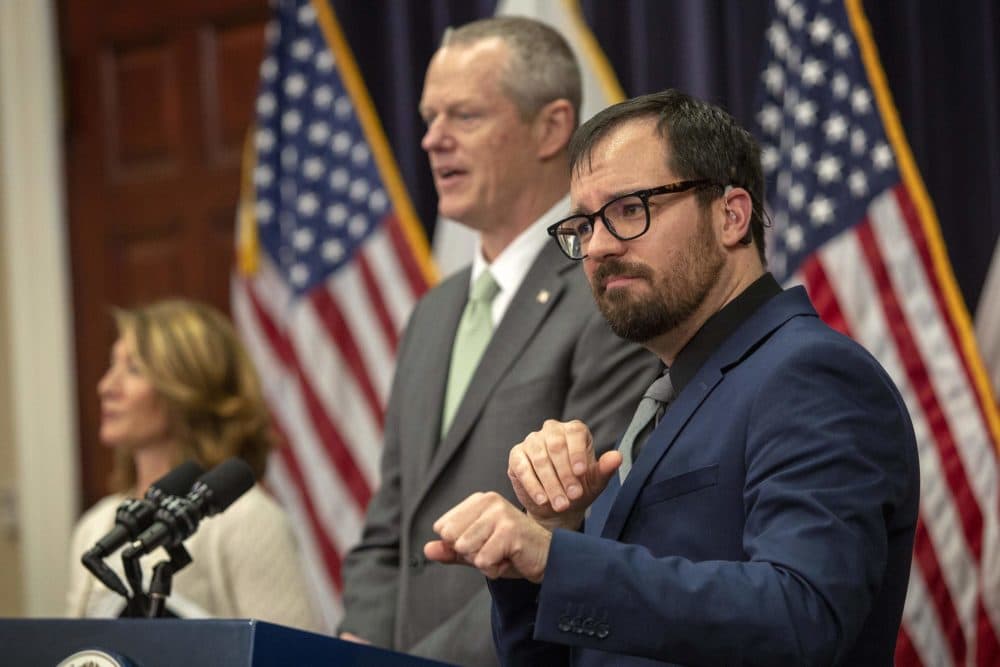
When Gov. Charlie Baker gives his daily coronavirus update, he's generally with the same small group of people who have now become familiar faces: Lt. Gov. Karyn Polito, Secretary of Health and Human Services Marylou Sudders and, before she got sick with the coronavirus, Dr. Monica Bharel, commissioner of the Department of Public Health.
And there's Rupert Dubler, the certified Deaf interpreter dressed in dark tones with a neatly-trimmed beard and dark-rimmed glasses, always standing 6 feet away from the lectern. He's become such a mainstay of the press briefings that during his off day (Wednesdays), his absence generates lots of buzz on social media.
It was even his birthday last week, and his fans on Twitter were only too happy to wish him a good day.
Dubler has traveled with Baker to various press conferences: usually at the State House but sometimes on the road at places like a Gillette Stadium parking lot or at Joint Base Cape Cod.
He's become such an important part of Baker's daily updates that, at a late March briefing while talking about the importance of social distancing, Baker pointed to Dubler and said, “I’ve been closer to this guy than I’ve been to anybody outside my wife for the past couple of weeks.”
The following day, Baker took a moment at the beginning of his briefing to properly introduce Dubler and his ASL partner to the assembled reporters and the television, radio and livestream audience.
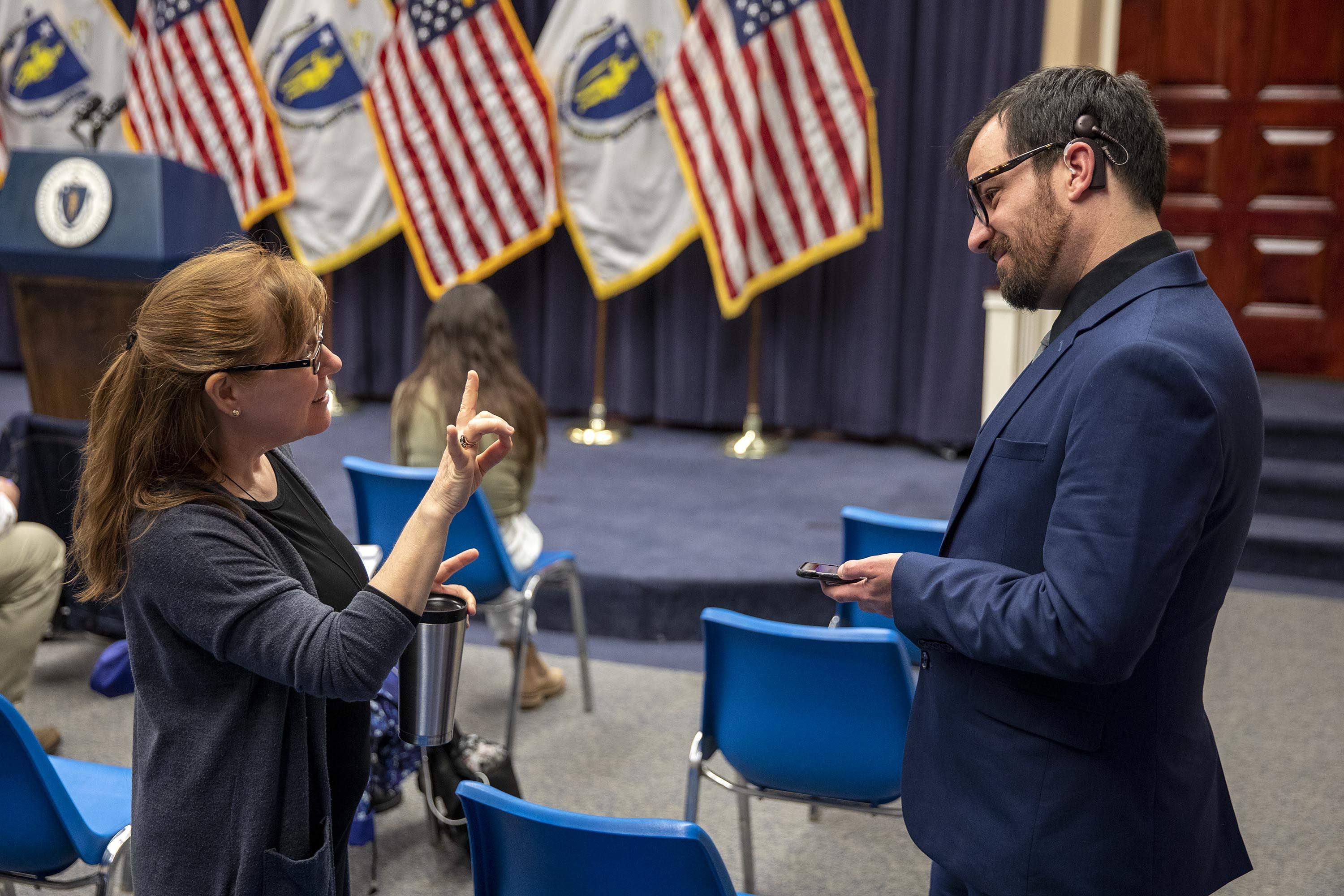
Dubler has been Deaf since birth, and cannot hear the governor's remarks. Each day, he works with a hearing partner who listens to the governor off-camera. The hearing partner, who varies from day to day, signs what is said at the briefing for Dubler, who simultaneously signs for the Deaf and hard of hearing audience, although many people with the ability to hear find Dubler's presence and demeanor on camera to be reassuring during a most stressful time.
Dubler is reluctant to discuss himself. He doesn't want to get in the way of the messages he is conveying at the briefings, he said, nor of the important work of signing for his audience.
"It is my belief that the focus is on message equivalency and the marginalized communities who we serve," he wrote in an email. "Drawing attention to the interpreter may result in the dilution of the message … and the message is critically important — literally life-and-death — in this public health crisis."
But he did agree to answer several questions via email for WBUR.
(Editor's note: The questions and answers have been lightly edited for clarity).
Steve Brown: Let’s start off with some basic biographical information, like about you, your background and your family.
Rupert Dubler: While I recognize the merits of doing this, I am admittedly reluctant to step forward for this interview...
However, I also recognize this as an opportunity to share some positive news during a difficult time and educate the public about the work we do. I am one of a group of talented certified Deaf interpreters (CDIs) who serve the commonwealth. I happen to be consistently assigned to the governor and occasionally the mayor of Boston, for many different reasons, and this is no reflection on my skills or my colleagues — it is an assignment that I or any of my colleagues would be proud to do.
I was born to Deaf parents and am the oldest sibling. My two younger siblings are both hearing and signed before they could talk.
I grew up mostly in San Diego County and graduated from the University of California San Diego with a degree in political science. I then spent nine years in Rochester, New York, then two years in Washington state before relocating here last October.
Although I do not wear a ring on the camera because it can be a visual distraction, I have been married to my loving partner, Brooke Dubler, a clinical psychologist, for seven years now.
I am not surprised that my interpretation enhances the message for those outside my target audience, but the fact that my work has a calming and supportive effect in this difficult time is gratifying to hear.
Rupert Dubler
What jobs have you had over the years?
I have been working in this field of sign language linguistics, research and interpreting in various capacities as a freelancer, trainer and in management roles. I have also worked in the domestic and sexual violence field, taught wilderness survival skills to teenagers, and managed a neuroplasticity lab. I am presently establishing myself here in Massachusetts as a freelance certified Deaf interpreter working mostly in government and legal settings.
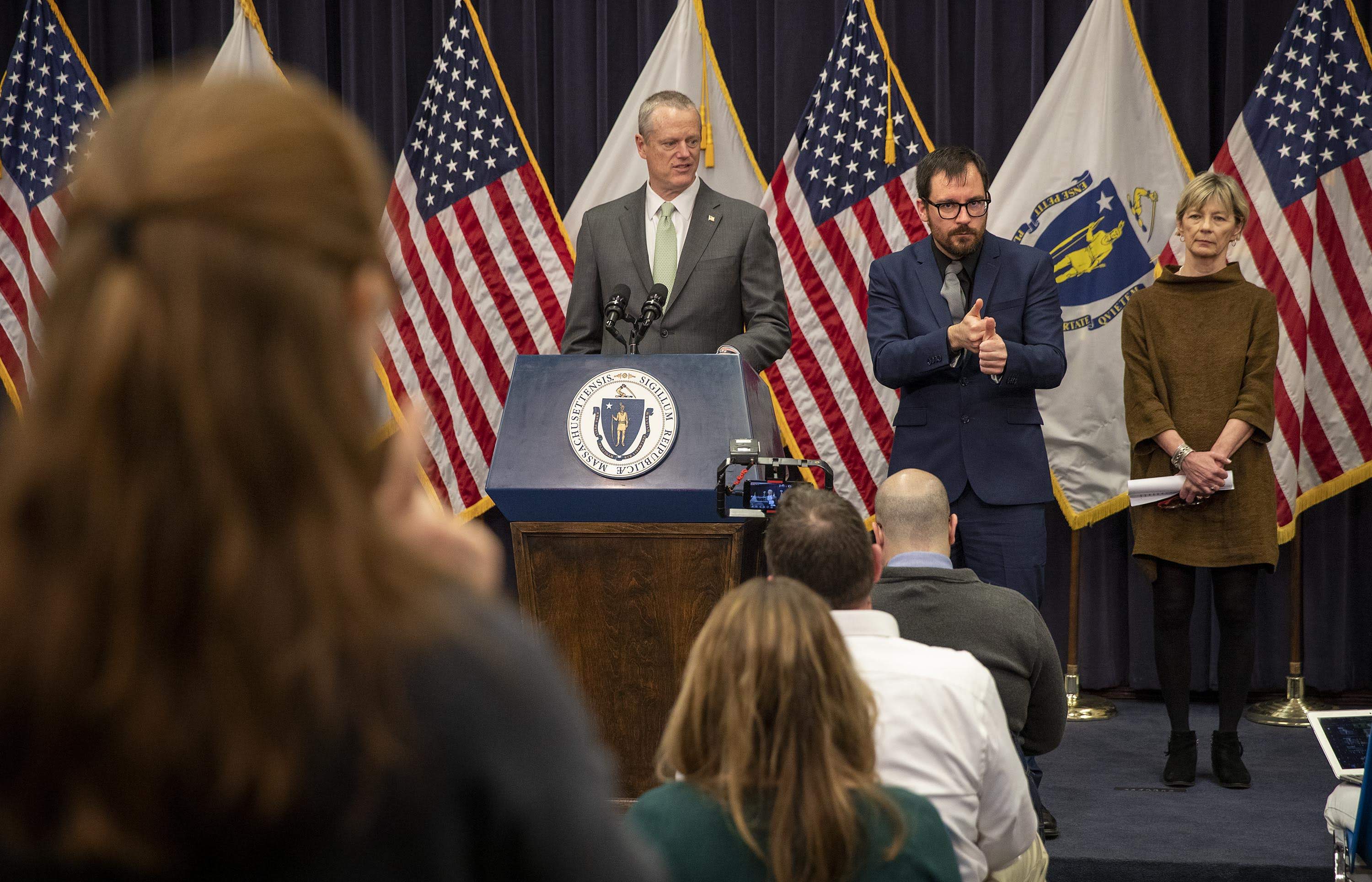
What, if any, are the challenges that come with being Deaf?
I was born Deaf with no residual hearing into a Deaf family, so I was surrounded by language models. This unrestricted and natural access to a true language from birth was what truly set me up for success and learning — it was just as natural as hearing people learning to speak.
I’ve noticed you have what appears to be a cochlear implant. How long have you had that? Is it effective? Has it helped you hear or process sound?
I chose to receive a cochlear implant, which I see as one of a full range of tools to assist me in navigating the world. The cochlear implant assists me primarily with some environmental sound awareness which is surprisingly helpful as a parent, improves my ability to lip read in certain situations, and in other small ways.
It has been an asset to me as an interpreter as well. I have worn it virtually every day for nearly two decades now and appreciate the small ways it has improved my life.
Ultimately, regardless of the cochlear implant, I am still Deaf and a member of a rich linguistic and cultural community.
Every time I have spoken with you, your hearing ASL partner has been with you and has translated for us. If, after this crisis is over, I bumped into you on the street, and you were by yourself, how would you and I be able to communicate, as I do not know ASL?
When you and I encounter each other on the street and want to have an actual conversation rather than the universal passing-by thumbs-up or hand wave, most Deaf people, myself included, tend to use a combination of gestures, old fashioned paper and pen, and perhaps a specific typepad app that may work with or without speech recognition.
Alas, that approach would violate social distancing. Perhaps there will be a new app coming down the pipeline. There have been many inventions that were intended for the Deaf and people with disabilities that were subsequently broadly accepted by the general society so perhaps this will be one of them.
When we’ve communicated before or after the briefings, you have communicated with me via your ASL partner only, coupled with facial expressions and the universal “thumbs up.” I notice you do not speak aloud. Is this a choice, and if so, why?
The reason I choose to not speak is because my voice is not intelligible to the untrained ear even after speech therapy on and off throughout my life. My voice is only somewhat more clear and articulated with more appropriate volume control when I am wearing my cochlear implant; however, it is natural for the average person to equate broken speech with diminished intelligence. Thus, I prefer to rely on other means of communication.
Tell me about what a certified Deaf interpreter is. What is the process to become a CDI? I understand CDIs often focus on particular disciplines (law, education, medicine, etc.) so they are better versed in that specific area. Is this so, and what areas have you focused on? Do you prepare for each the same or differently?
Virtually all ASL-English hearing interpreters today became interpreters after completing a four-year interpreter training degree such as the ones offered at Northeastern University or Framingham State University. Thus, those students often learned ASL to various levels of fluency in college and never attain a true level of fluency even after decades as an interpreter.
Even hearing children born to Deaf parents typically do not become fluent to the level of Deaf people because they do not use or rely on sign language as the primary means of communication; however, sign language interpreters collectively represent one of the most dedicated group of professionals who can be found in every imaginable situation to provide access to a marginalized community.
Most Deaf individuals are born into hearing families and experience significant to severe language deprivation within the home which has profound lifelong ramifications. This is slowly improving in some parts of the country but so many children are still being left behind. Those children grow up to become adults. The consequences of language deprivation can make navigating the world a lifelong challenge to various degrees.
A Certified Deaf Interpreter may be best described as a linguistic and cultural specialist who typically, but not always, works as a team with an ASL-English interpreter (often referred to simply as an “ASL Interpreter”). The value of a cohesive team is immense and can have synergistic benefits in the interpretation work being produced. It is indeed a nuanced partnership.
A CDI is often called to interpret assignments where there are or may be multiple communication challenges to contend with or if the assignment is high risk and/or high stakes. We traditionally work with consumers who present with atypical sign language, developing language (children in particular) or cultural factors that call into question the clarity of an interpretation by a generalist without native fluency in the language and intimate knowledge of the Deaf culture.
We CDIs often work with individuals who experience language deprivation, particularly in the medical and mental health setting, because we are more likely by virtue of our lifelong experience to parse apart what is atypical language from potential symptoms of interest to mental health professionals.
A typical hearing interpreter — even those with extensive mental health training — is more likely to make an incorrect symptom differentiation, which has implications for diagnosis and treatment. In the legal setting, misunderstandings could lead to say, broken-up families or imprisonment of an innocent person. We are also found interpreting for the DeafBlind community.
To become a CDI, a Deaf person must complete a series of trainings, possess real world experience and native or near-native level signing skills, have an intimate understanding of our rich culture and then go on to pass national knowledge and performance exams.
Since CDIs are relatively new to the interpreting profession, there are approximately 200 CDIs out of 15,000 certified ASL-English interpreters in the U.S. The CDIs are not evenly distributed across the country so significant gaps remain. Nevertheless, there is an enormous and growing demand for CDIs especially in mental health and legal arenas … and now press conferences.
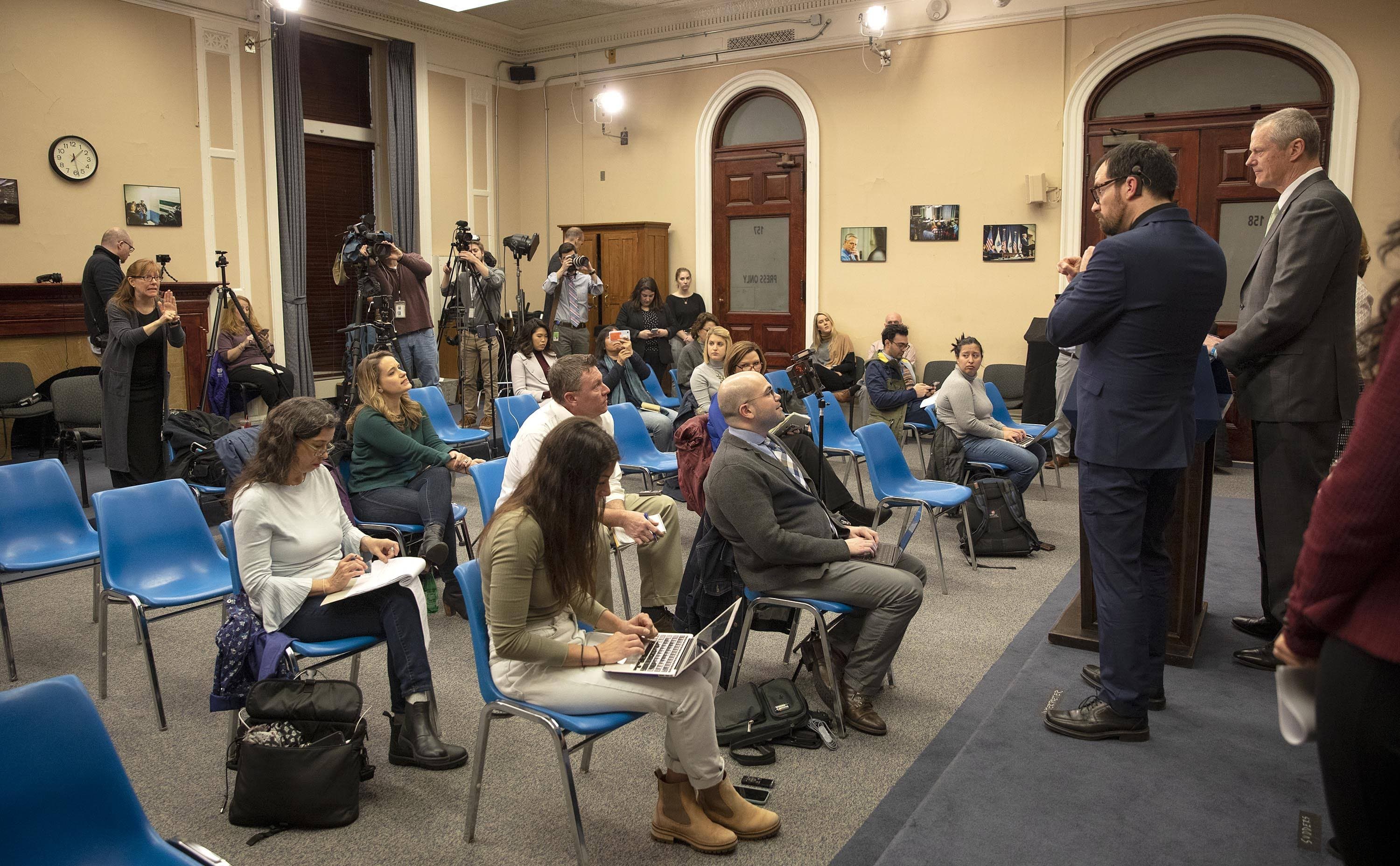
In Massachusetts alone, right now, there is a Deaf interpreter interpreting whenever possible for the press conferences by the state, city of Boston, and city of Worcester. Often, the barrier in bringing in a CDI to interpret the press conference has to do with educating the requestors about the value of providing this access to the large Deaf community in the commonwealth. Most press conferences do not have a sign language interpreter, which is concerning because every single person’s understanding and participation in social distancing during this epidemic is critically important to flatten the curve.
What are your thoughts about closed captioning vs. ASL?
Closed captioning is a valuable visual tool for viewers to understand audible messages clearly, especially those who have difficulty in hearing the audio portion. This population includes elders, Deaf, hard of hearing or late-Deafened individuals who prefer to read print.
Captioning services are based on the primary spoken language including English, Spanish or other spoken languages.
Many Deaf community members prefer having a Deaf interpreter who is a native language user. American Sign Language (ASL) is a visual language used by members of the Deaf community, who rely on “the shape, placement, and movement of the hands, as well as facial expressions and body movements, which play important parts in conveying information."
Like any spoken language, ASL is a language with its own unique rules of grammar and syntax. ASL is recognized as a language in Massachusetts.
I've noticed you are a sharp dresser. Do you dress differently for different interpreting jobs?
Generally, it’s our desire to be unobtrusive and not add “visual noise” or otherwise stand out during the assignment by dressing professionally and appropriately. We interpreters often wear a long-sleeved black shirt without a jacket or tie.
In fact, when you attend a Deaf community event wearing a professional black shirt, some people might think you are a working interpreter and might not initiate a conversation with you directly. In fact, many of us interpreters compensate for all the black by wearing bold color socks while working or bright colored clothing on the days we aren’t working.
How are you feeling about this attention? I told you about my friend wondering on Facebook where you were when you had a day off, and showed you the post where she said her husband finds you to be a calming influence throughout all of this. What are your thoughts about that? When you are interpreting for the governor or mayor, they are making announcements about various things that we are often hearing for the first time. Do you get surprised by what is being said? Does a little voice go off in the back of your head that says “Wow!”? How do you not let that interrupt your signing?
Interpreting press conferences as a CDI is seen by many in our profession as one of the ultimate challenges. There is the fundamental nature of press conferences with the surprise announcements and seemingly random questions from the press all happening typically at a rapid clip.
There is also the mundane challenge of my team not being able to hear the question being asked, my looking at the camera as much as possible to maintain eye contact with my target “audience” while not missing any information being fed to me by my colleague, and ignoring the bright light shining into my eyes.
Those demands aside, there is also the reason why we are up there instead of the ASL-English interpreter. Our target audience is not the whole Deaf community but rather those who do not access information delivered in English. The task in front of me is to re-interpret what is being provided to me by the ASL-English interpreter in real time into a form of sign language that is as accessible as possible for as many Deaf individuals as possible, specifically those who cannot fall back on the closed captioning or other sources of written English. This means my interpretation needs to eliminate as many English intrusions as possible while keeping up with the pace of the speaker.
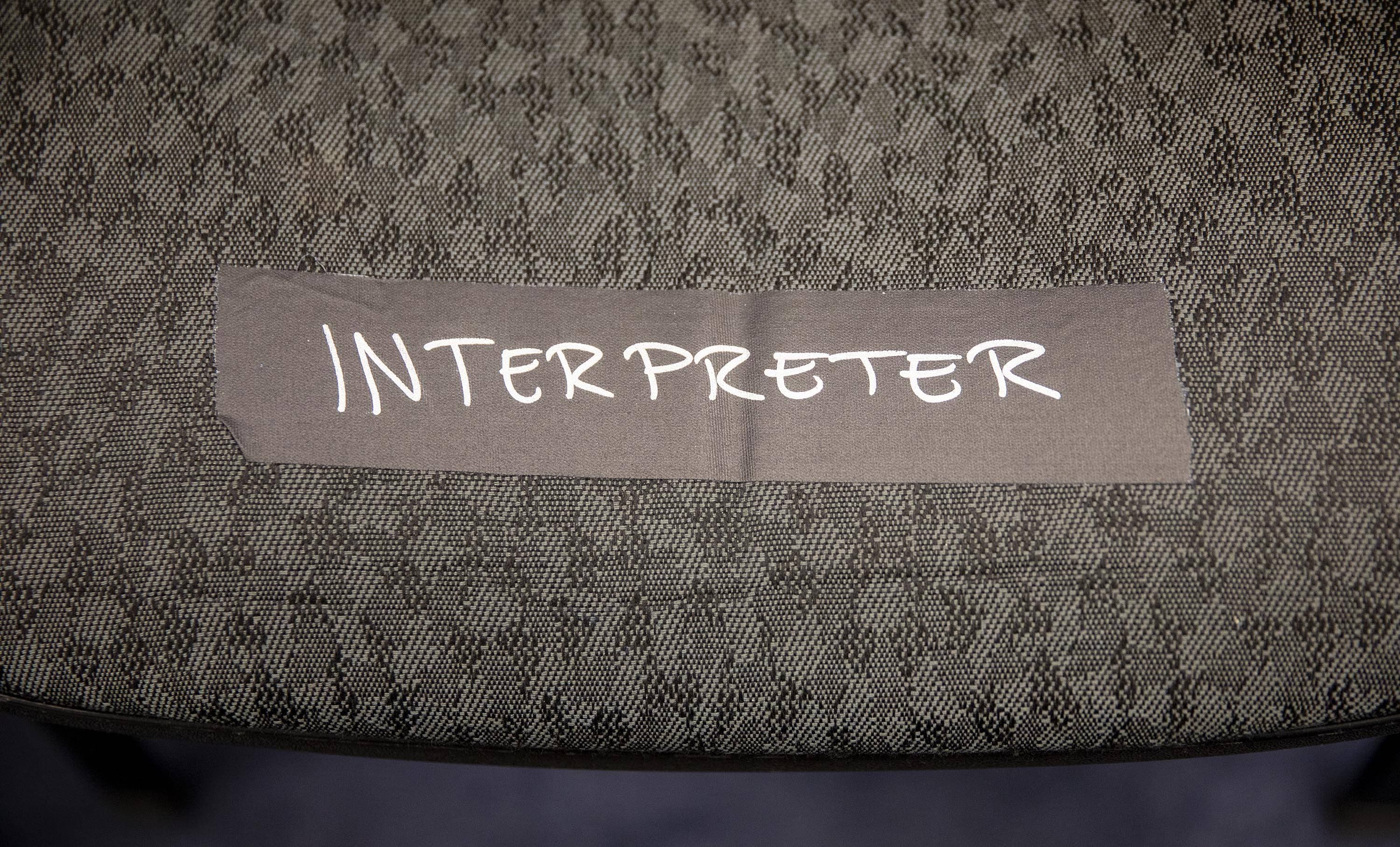
Achieving this is realistic up to a point and depends on many different factors. As you can imagine, interpreting press conferences and delivering consistently accurate interpretation over an extended period of time during a stressful period of time is a very difficult task — especially in circumstances where there are no prep materials provided.
I do want to take a moment to recognize the staff working for both the governor and the mayor of Boston for providing us with their talking points just prior to the press conference starting. This information is absolutely critical in helping us to anticipate interpretation issues and potentially work out solutions before we start.
Since most people do not fully understand the demanding nature of interpreting press conferences, CDIs are historically criticized for the decisions they make while interpreting on the fly. It is indeed impossible to please everybody.
Fortunately, our community is evolving to embrace CDIs and the feedback I’ve received thus far has been overwhelmingly positive. I am not surprised that my interpretation enhances the message for those outside my target audience but the fact that my work has a calming and supportive effect in this difficult time is gratifying to hear.
Public service is a passion of mine because I wouldn’t be where I am today if not for the numerous public servants that helped me along the way.
It is truly my honor and privilege to serve the commonwealth in this difficult time. We will overcome this crisis and come out together more resilient than ever.
Anything else I should know?
It is common for people to ask how they might learn ASL or even pursue interpreting. Onsite and online courses for American Sign Language are offered at multiple colleges statewide as well as interpreting training programs at Northeastern University, Framingham State University, and Northern Essex Community College.
